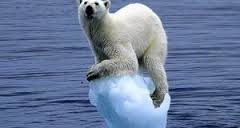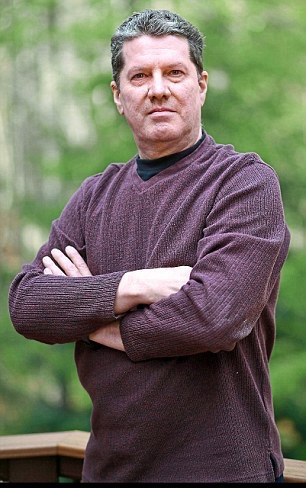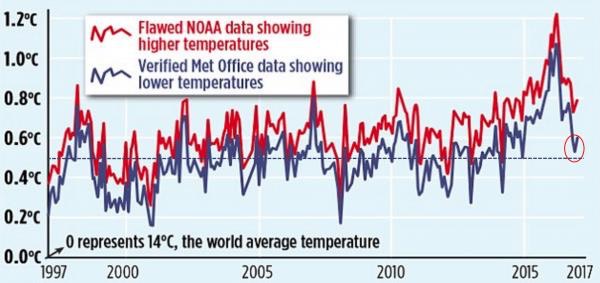
Dr John Bates' disclosures about the manipulation of data behind the so-called 'Pausebuster' paper is the biggest scientific scandal since 'Climategate' in 2009 when, as Britain's Daily Mail reported, thousands of leaked emails revealed scientists were trying to block access to data, and using a 'trick' to conceal embarrassing flaws in their claims about global warming.
Britain's Mail on Sunday today revealed astonishing evidence that the organisation that is the world’s leading source of climate data rushed to publish a landmark paper that exaggerated global warming and was timed to influence the historic Paris Agreement on climate change.
A high-level whistleblower has told this newspaper that America’s National Oceanic and Atmospheric Administration (NOAA) breached its own rules on scientific integrity when it published the sensational but flawed report, aimed at making the maximum possible impact on world leaders including Barack Obama and David Cameron at the UN climate conference in Paris in 2015.
The report claimed that the ‘pause’ or ‘slowdown’ in global warming in the period since 1998 – revealed by UN scientists in 2013 – never existed, and that world temperatures had been rising faster than scientists expected. Launched by NOAA with a public relations fanfare, it was splashed across the world’s media, and cited repeatedly by politicians and policy makers.
But the whistleblower, Dr John Bates, a top NOAA scientist with an impeccable reputation, has shownThe Mail on Sunday irrefutable evidence that the paper was based on misleading, ‘unverified’ data.

It was never subjected to NOAA’s rigorous internal evaluation process – which Dr Bates devised.
His vehement objections to the publication of the faulty data were overridden by his NOAA superiorsin what he describes as a ‘blatant attempt to intensify the impact’ of what became known as the Pausebuster paper.
In an exclusive interview, Dr Bates accused the lead author of the paper, Thomas Karl, who was until last year director of the NOAA section that produces climate data – the National Centers for Environmental Information (NCEI) – of ‘insisting on decisions and scientific choices that maximised warming and minimised documentation… in an effort to discredit the notion of a global warming pause, rushed so that he could time publication to influence national and international deliberations on climate policy’.

The scandal has disturbing echoes of the ‘Climategate’ affair which broke shortly before the UN climate summit in 2009, when the leak of thousands of emails between climate scientists suggested they had manipulated and hidden data. Some were British experts at the influential Climatic Research Unit at the University of East Anglia.
His disclosures are likely to stiffen President Trump’s determination to enact his pledges to reverse his predecessor’s ‘green’ policies, and to withdraw from the Paris deal – so triggering an intense political row.
As The Mail continues, whatever takes its place, said Dr Bates, "there needs to be a fundamental change to the way NOAA deals with data so that people can check and validate scientific results. I’m hoping that this will be a wake-up call to the climate science community – a signal that we have to put in place processes to make sure this kind of [nonsense] doesn’t happen again.
"I want to address the systemic problems. I don’t care whether modifications to the datasets make temperatures go up or down. But I want the observations to speak for themselves, and for that, there needs to be a new emphasis that ethical standards must be maintained."
He said he decided to speak out after seeing reports in papers including the Washington Post and Forbes magazine claiming that scientists feared the Trump administration would fail to maintain and preserve NOAA’s climate records.
Dr Bates said: "How ironic it is that there is now this idea that Trump is going to trash climate data, when key decisions were earlier taken by someone whose responsibility it was to maintain its integrity – and failed."
NOAA not only failed, but it effectively mounted a cover-up when challenged over its data.
After the paper was published, the US House of Representatives Science Committee launched an inquiry into its Pausebuster claims. NOAA refused to comply with subpoenas demanding internal emails from the committee chairman, the Texas Republican Lamar Smith, and falsely claimed that no one had raised concerns about the paper internally.
Last night Mr Smith thanked Dr Bates "for courageously stepping forward to tell the truth about NOAA’s senior officials playing fast and loose with the data in order to meet a politically predetermined conclusion".
He added: "The Karl study used flawed data, was rushed to publication in an effort to support the President’s climate change agenda, and ignored NOAA’s own standards for scientific study."
Professor Curry, now the president of the Climate Forecast Applications Network, said last night: ‘Large adjustments to the raw data, and substantial changes in successive dataset versions, imply substantial uncertainties.’
It was time, she said, that politicians and policymakers took these uncertainties on board.